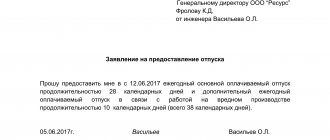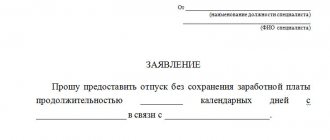Article 123. Sequence of granting annual paid leave
There is a general rule on this issue: all types of leave, including basic, additional, paid and unpaid, without pay, are provided with prior agreement with the employer. That is, the answer to the question of when you can take leave under the Labor Code is as follows: when you can come to an agreement with the administration of the organization.
Of course, this does not cancel the employee’s right to rest, but the priority must be established so that this does not affect the work process. And, of course, there are emergency cases, force majeure circumstances, when the employer does not have the right to refuse an employee. If an agreement cannot be reached, the conflict must be resolved through mutual concessions in accordance with the norms of the Labor Code.
Paid leave must be provided to the employee annually.
The right to use vacation for the first year of work arises for the employee after six months of continuous work with this employer. By agreement of the parties, paid leave may be granted to the employee before the expiration of six months.
for women - before maternity leave or immediately after it;
employees under eighteen years of age;
employees who have adopted a child (children) under the age of three months;
in other cases provided for by federal laws.
Leave for the second and subsequent years of work can be granted at any time of the working year in accordance with the order of provision of annual paid leave established by a given employer.
The order of provision of paid vacations is determined annually in accordance with the vacation schedule approved by the employer, taking into account the opinion of the elected body of the primary trade union organization no later than two weeks before the start of the calendar year in the manner established by Article 372 of this Code for the adoption of local regulations.
The vacation schedule is mandatory for both the employer and the employee.
The employee must be notified of the start time of the vacation by signature no later than two weeks before it begins.
Certain categories of employees, in cases provided for by this Code and other federal laws, are granted annual paid leave at their request at a time convenient for them. At the request of the husband, he is granted annual leave while his wife is on maternity leave, regardless of the time of his continuous work with this employer.
Can a manager refuse a newcomer?
When can you take vacation immediately at a new job? There are, however, some categories of people who can go on vacation without complying with the 6-month rule - even the next day after employment. When and to whom is it provided immediately after hiring without having worked for 6 months:

Minor employees.- Women going on maternity leave - they can, at their request, be granted annual leave before or immediately after such leave.
- Adoptive parents who took in children under 3 months.
- A husband whose wife is on maternity leave.
- Teachers of disabled children.
- Part-timers. They must have vacations for both jobs at the same time, and therefore, if such an employee has not yet worked for 6 months, then the vacation is provided to him as an advance.
- Wives or husbands of military personnel who wish to go on vacation with their spouse (Part 11, Article 11 of the Federal Law “On the Status of Military Personnel”).
- Persons injured during nuclear tests at the Semipalatinsk test site or during the liquidation of the consequences of the explosion at the Chernobyl Nuclear Power Plant (Clause 15, Article 2 of the Federal Law “On social guarantees for citizens exposed to radiation...” No. 2-FZ of January 10, 2002 and Article 14 of the Law Russian Federation “On the social protection of citizens exposed to radiation as a result of the disaster at the Chernobyl nuclear power plant”).
- Disabled war veterans (Article 15 of the Federal Law “On Veterans”).
- Heroes of the USSR, Russia, full holders of the Order of Glory (RF Law No. 4301-1 of January 15, 1993).
- Employees of the Ministry of Internal Affairs who did not use their vacation before the end of the year (Part 3 of Article 57 of the Federal Law “On Service in the Internal Affairs Bodies...” No. 342-FZ of November 30, 2011).
- Honorary donors (clause 1, part 1, article 23 of the Federal Law “On the donation of blood and its components”).
- Heroes of Socialist Labor, Heroes of Labor of the Russian Federation, full holders of the Order of Labor Glory (Part 2 of Article 6 of the Federal Law of 01/09/1997 No. 5-FZ).
The question also arises: does the employer have the right to refuse leave to an employee who is not yet included in the vacation schedule? Based on the law, he does not have such a right.
Art. 124 makes it possible, in exceptional cases when going on vacation is unfavorable for the enterprise, to postpone the vacation to another time - but this requires the consent of the employee. If he does not agree, there is no possibility of refusal.
Thus, if for some reason it is impossible to grant leave to a person who has already worked for six months, the employer has only one way out - to persuade and agree.
In the same case, if you simply do not give the employee the opportunity to rest, then the perpetrators will face administrative liability.
Art. 5.27 of the Code of Administrative Offenses of the Russian Federation provides for a fine in this case:
- For officials – from 1 to 5 thousand rubles.
- For individual entrepreneurs – from 1 to 5 thousand rubles.
- For organizations – from 30 to 50 thousand.
Repeated violation increases the punishment: not only do fines increase, but officials are also subject to disqualification.
How to calculate how many vacation days you can get
It is important to note that almost all categories of workers receive the right to leave. The only exceptions are those who work under civil law agreements. Such documents include contract agreements and a number of others.
The term vacation itself should be understood as uninterrupted rest for a certain number of days, during which the employee retains his job, salary, etc.
The second part of Article 122 of the Labor Code of the Russian Federation states that an employee automatically receives the right to leave after completing six months of service without breaks with the same employer. Simply put, if you have already worked for exactly six months, you have thus earned your right to legal rest.
Labor lawyers recommend discussing this point with the employer immediately upon applying for a job. It’s good if it is specified in one of the clauses of the employment contract, which is signed with your superiors. Experts also note that providing leave after six months of work is the responsibility of each employer. Therefore, no one has the right to refuse this.
We invite you to read: Preferential length of service in different professions and harmfulness: how to calculate
Annual additional paid leave is provided to employees engaged in work with harmful and (or) dangerous working conditions, employees with a special nature of work, employees with irregular working hours, employees working in the Far North and equivalent areas, as well as in other areas. cases provided for by this Code and other federal laws.
Employers, taking into account their production and financial capabilities, can independently establish additional leaves for employees, unless otherwise provided by this Code and other federal laws. The procedure and conditions for granting these leaves are determined by collective agreements or local regulations, which are adopted taking into account the opinion of the elected body of the primary trade union organization.
Upon dismissal due to the expiration of the employment contract, leave with subsequent dismissal may be granted even when the vacation time completely or partially extends beyond the term of this contract. In this case, the day of dismissal is also considered the last day of vacation.
When granting leave with subsequent dismissal upon termination of the employment contract at the initiative of the employee, this employee has the right to withdraw his resignation letter before the start date of the leave, unless another employee is invited to take his place by transfer.
Additional permission is granted on the basis of law for certain categories of workers or in accordance with internal local regulations of the organization. They are:
- workers in hazardous or unhealthy conditions;
- underage;
- teaching staff;
- workers on irregular working hours and other categories, in accordance with the Labor Code of the Russian Federation.
The calculation is made based on the norms of the Labor Code and by-laws of the Russian Federation. It should be noted that for each full month of work, the employee is accrued 2.33 days of annual paid leave. The calculation is carried out not by calendar, but by working years from the date of taking office. That is, if an employee worked for 6 months, he is entitled to a vacation of 14 days, if 7 - 16, etc. Thus, the right to 28 calendar days appears after working a working year: 12 months.
The length of service that gives the right to long rest includes not only periods of work, but also the time when the employee retained his place, and the period of leave without pay (up to 14 days). This is enshrined in Art. 121 Labor Code of the Russian Federation. Thus, time on sick leave is also included in this length of service.
When does the right to first leave arise?
Citizens with whom both a fixed-term and an open-ended employment contract have been concluded can write an application for annual leave after 6 months of continuous service in one company . In practice, this point must be discussed with the employer, since he has the right to postpone the rest period in case of production necessity.
A new employee must take vacation time during the work year, not the calendar year . If he was hired on November 20, 2021, then leave is given until November 19, 2018. This period is taken as the billing period.
The employer is responsible for compliance with this rule and must send the employee on annual leave after 11 months of continuous service after being hired .
The employee has the right to replace the prescribed rest days with monetary compensation once every two years.
Read more about the rules for replacing vacation with compensation here.
According to Art. 121 of the Labor Code of the Russian Federation, the length of service that gives the right to annual leave does not include the following periods:
- For child care;
- Absence of an employee from the workplace without good reason.
In addition to the actual days worked, when calculating continuous service, the following are taken into account:
- periods when the employee, in accordance with labor legislation and local regulations, retains his position and average salary;
- forced absenteeism during illegal removal from work or upon reinstatement after dismissal, including when he did not undergo a medical examination through no fault of his own;
- vacation time without pay, if it does not exceed 14 calendar days.
Watch a video about the features of providing vacations:
Off schedule
There are categories of workers whose representatives can go on vacation at any time convenient for them, having notified them in advance.
These include:
- citizens under 18 years of age;
- women and single men raising two or more children under 12 years of age, in addition, they have the first priority to “book” summer time;
- employees previously recalled from vacation;
- part-timers. It is clear that the periods of rest at the main and additional jobs must coincide;
- one of the parents raising a disabled child under the age of 18;
- spouses of military personnel, who also have the right to rest at the same time as their husbands and wives;
- honorary donors of the Russian Federation;
- some categories of Chernobyl victims.
In 2021, a new article was introduced into the Labor Code of the Russian Federation - 262.2. Under this provision, employees with three or more children can now take leave at a time convenient to them, in accordance with their expressed preference.
Who else can rest without working the legally required period of 6 months:
- in the case of adoption of an infant (that is, a child under three months of age);
- In the event of pregnancy, a woman can take leave ahead of schedule, before her due maternity leave or immediately immediately after it.
Furthermore, in accordance with Art. 122 of the Labor Code of the Russian Federation, the employer himself has the right to send an employee to rest at his own expense before the expiration of the six-month period of work.
Compensation for unused rest days
The employer is required to provide annual leave to each employee. If he has not done this for two years in a row (regardless of the desire of the employee himself), then he may be brought to administrative responsibility under Article 5.27 of the Code of Administrative Offenses of the Russian Federation. The fine in this case ranges from 30,000 to 50,000 rubles.
Read more about HOLIDAY PAYMENTS
- recommendations and assistance in resolving issues
- regulations
- forms and examples of filling them out
ConsultantPlus TRY FREE
Duration of the first vacation after 6 months: how many days is the employee entitled to? After six months of employment, a person receives the right to full primary, additional, extended or other types of rest provided for by the terms of the employment contract. The opinion of some employers that vacation after 6 months of work should be taken in parts is erroneous. According to Art. 115 the duration of annual rest cannot be less than 28 days (calendar).
Registration of vacation in the first year of employment in advance is not prohibited by the legislation of the Russian Federation. But if a person quits before working the year for which the right to rest has already been exercised, the employer can withhold the excess amount of vacation pay issued to the individual (Article 137 of the Labor Code). When calculating, it is necessary to take into account the rule of the maximum amount of deductions from earnings - 20% (Article 138 of the Labor Code).
We invite you to read: Liability of individual entrepreneurs for the debts of an individual
What does the Labor Code say about vacation after 6 months? After all, new employees can start working in the organization after the schedule is approved by the manager. In this matter, neither the employer nor the employee is limited in any way. Since retroactive changes to the vacation schedule are usually not made, the newly hired employee will have to write an application for the first vacation.
The procedure for registering leave in the first year of employment is no different from the paperwork for subsequent periods of work. If there is an application, it is required to be approved by the company management, then an order is issued in the unified form T-6 indicating the start/end dates of the vacation and the employee’s full name. After that, a calculation of vacation pay is drawn up according to the T-60 form, the data is entered into the personal card and, upon the fact of using the vacation, into the work time sheet.
According to the general rules, vacation pay is calculated based on average earnings for the previous year (12 months). If a person has been working in an organization for less than a year, the calculation takes into account the salary for the period from the moment of employment to the month preceding the month of vacation (Resolution No. 922 of December 24, 2007). The billing period and average earnings are determined using the same principle.
Providing leave after six months is not the employer’s obligation, it is the employee’s right. Before going on vacation, you must agree on the date with your supervisor. At the same time, according to Part 2 of Art. 122 of the Labor Code of the Russian Federation, the categories of citizens listed below may not coordinate it with the leadership.
These include workers:
- pregnant women;
- minor workers;
- employees who adopted a newborn.
After 6 months of work, vacation is granted in the number of days as if the employee had worked a calendar year, or a minimum of 14 days. According to the law, you need to decide on vacation before the 11th month of work, since the 12th month is already considered the time of paid vacation.
An employee must take his first vacation within a period of six months to a year of work. Control over this process rests with the employer. In case of violation of such a norm, it is he who is responsible before the law. Once every two years, an employee can refuse to rest and ask for compensation for these days.
How many days must an employer provide for rest? Based on Art. 115 of the Labor Code of the Russian Federation, an employee is entitled to 14 days after six months of work. Employees listed below are entitled to additional rest time:
- working in difficult, harmful, dangerous conditions;
- employees in educational institutions;
- minor employees;
- having irregular working hours.
Its duration is determined based on belonging to a certain category.
Leave is granted by the employer upon application by the employee. You can not allow someone to go on vacation only if there are compelling reasons for this, if there is no one to replace the employee. The employee agrees on the date, since the employer has the right to postpone the rest period to another period if necessary.
How many days of rest are required after 6 months and is the employer obliged to provide it? So, let’s assume that a person got a job, his work experience has already reached 6 months - and he decided that it was time to rest. Does this mean that he must be given leave on a mandatory basis?
In fact, this question is ambiguous. On the one hand, Art. 122 indicates that after six months of work, the employee has the right to leave. On the other hand, the words “must be provided” refer there to a completely different case, to the above-mentioned persons who have benefits.
The employer is required to have a vacation schedule, but new employees may not be included in it until after their first year of work. However, in practice it is considered that Art. 122 has priority because it protects the rights of the employee as the “weaker” side of labor relations. This is the position most often held by both judges and Rostrud employees.
A separate question arises about how long such a newcomer can rest. On the one hand, Art. 115 indicates that the duration of leave must be at least 28 days. On the other hand, if a newcomer decides to quit without working for a full year, then part of the vacation pay will also turn out to be “not worked out,” and collecting it through the court is very problematic.
Article 115 of the Labor Code of the Russian Federation. Duration of annual basic paid leave
Annual basic paid leave is provided to employees for 28 calendar days.
Annual basic paid leave of more than 28 calendar days (extended basic leave) is provided to employees in accordance with this Code and other federal laws.

The solution to this issue is often to divide the vacation into parts. This is allowed by law - and in this case, in the event of a possible dismissal, it turns out that the employee has used his annual vacation in full, he does not need to pay compensation - but there is no overpayment. However, this option is only permissible with the consent of the employee.
Duration of the first rest
Employees who have changed jobs often ask HR officers when they can take vacation for the first time. The first time you can write a statement in accordance with Art. 122 of the Labor Code of the Russian Federation, provided that the citizen has been working at one enterprise for more than six months. Thus, there is a rule: you need to work at a new enterprise for at least six months before you can expect to rest at the employer’s expense. But there are exceptions to it: some categories of workers have the right to rest before the expiration of this period, for example, citizens under 18 years of age.
Yes it is possible. The second part of Article 122 of the Labor Code of the Russian Federation says that the employer can provide leave earlier. It is important to understand that in most cases this decision can only be made by the head of the enterprise himself. That is, there is no reason to demand the first vacation from him until the person has worked continuously for the first six months. Unless, of course, the employee is one of the persons named in part three of Article 122 of the Labor Code of the Russian Federation.
Indeed, the Labor Code determines that some categories of employees have the right to leave even before the expiration of six months from the start of their work at a given enterprise. Namely:
- women before or immediately after maternity leave;
- minors (under 18 years of age);
- adoptive parents of minors under three months of age.
Other exceptions to the general rule are possible if they are stipulated by federal laws.
The duration of rest, as agreed by the parties to the employment contract, can be 28 calendar days. But in practice, its duration may depend on a large number of different factors. Therefore, it is also better to agree on this point when applying for a job at the company.
We suggest you read: Criminal case on alimony - All about alimony
In accordance with the requirements of Article 115 of the Labor Code of the Russian Federation, all employed citizens have the right to receive an annual vacation paid by the employer for a duration of 28 calendar days. That is, for each year of official employment, each employee is entitled to 28 days for rest. Those who have recently changed jobs ask HR officers when the first leave under the Labor Code is granted, do they need to work a whole year for this?
Article 122 of the Labor Code of the Russian Federation says no. It is necessary to work in a new place for 6 months in a row, and the employee has the right to write an application for a paid vacation period. Here it is necessary to understand that the employer is not obliged to provide leave after six months of work: the Labor Code of the Russian Federation speaks exclusively about this possibility.
The procedure for granting vacation days
To get the opportunity to rest after working for 6 months, it is advisable to draw up an application.
The entire process for the employee will require a certain execution sequence:

- drawing up an application for leave indicating the duration and date of the first day or exact time limits;
- approval of the application from the manager;
- submission of an agreed application to the HR department;
- signing of the order by the interested party.
Leave 6 months after employment is granted only after all documents have been completed. In some organizations, if an employee goes on vacation as scheduled, filing an application is not required. If the company has a vacation schedule and the employee does not fit into it, an additional application for transferring rest days will be required.
However, if an employee came to work this year and is not included in the schedule, then after 6 months of service he can go on vacation as agreed with the employer.
Often, a change is made to the schedule by order due to the arrival of a new employee and taking into account the existing procedure applicable to other employees.
Dear readers! To solve your problem right now, get a free consultation
— contact the on-duty lawyer in the online chat on the right or call:
+7
— Moscow and region.
+7
— St. Petersburg and region.
8
- Other regions of the Russian Federation
You will not need to waste your time and nerves
- an experienced lawyer will take care of solving all your problems!
Vacation at your own expense
A citizen can take several (the maximum limit is defined only for civil servants - 1 year) days at his own expense. Such time off is provided only upon application and in agreement with the administration, except for the following cases:
- WWII participants have the right to take an additional 35 calendar days off per year;
- working age pensioners - 14;
- working disabled people - 60;
- parents and wives (husbands) of military personnel, firefighters, etc., killed in action - 14.
In addition, the manager is required to sign an application for 5 days at his own expense in the event of the birth of a child, registration of marriage, or death of a close relative.
For those who are on maternity leave
Scheduled leave as a break from work and maternity leave are different, unrelated periods. They are provided for different reasons, have different durations (28 and 140 days on average), and payment for such periods is made according to different rules. Every employee is entitled to annual rest of 28 calendar days after six months of work at one enterprise; a woman cannot be limited in this right. Maternity leave and parental leave are provided regardless of working a certain period of time before pregnancy.
Article 124. Extension or postponement of annual paid leave
temporary disability of the employee;
the employee performs state duties during his annual paid leave, if the labor legislation provides for exemption from work for this purpose;
in other cases provided for by labor legislation and local regulations.
If the employee was not paid in a timely manner for the period of annual paid leave or the employee was warned about the start time of this leave later than two weeks before its start, then the employer, upon the written application of the employee, is obliged to postpone the annual paid leave to another date agreed with the employee.
In exceptional cases, when the provision of leave to an employee in the current working year may adversely affect the normal course of work of an organization or individual entrepreneur, it is allowed, with the consent of the employee, to transfer the leave to the next working year. In this case, the leave must be used no later than 12 months after the end of the working year for which it is granted.
It is prohibited to fail to provide annual paid leave for two years in a row, as well as to not provide annual paid leave to employees under the age of eighteen and employees engaged in work with harmful and (or) dangerous working conditions.
Right or obligation of the employer?

Is an employer required to provide vacation after 6 months of work? This issue often becomes a stumbling block between the interests of the employee and the employer.
The latter may mistakenly believe that he is not obliged to provide it immediately after the period of 6 months from the date of employment. However, it is not. An employee has the right to go on vacation for 14 days after working for more than 6 months.
However, he can do this later, for example, if an employee in a similar position is on vacation, on sick leave, etc.
Refusal to provide rest time for an employee may result in an appeal to the competent authorities with subsequent inspections.
Article 125. Division of annual paid leave into parts. Review from vacation
By agreement between the employee and the employer, annual paid leave can be divided into parts. Moreover, at least one part of this leave must be at least 14 calendar days.
Recall of an employee from vacation is permitted only with his consent. The part of the vacation unused in this regard must be provided at the employee’s choice at a time convenient for him during the current working year or added to the vacation for the next working year.
Employees under the age of eighteen, pregnant women and employees engaged in work with harmful and (or) dangerous working conditions are not allowed to be recalled from vacation.
Article 126. Replacement of annual paid leave with monetary compensation
Part of the annual paid leave exceeding 28 calendar days, upon written application of the employee, can be replaced by monetary compensation.
When summing up annual paid leave or transferring annual paid leave to the next working year, monetary compensation can be replaced by a part of each annual paid leave exceeding 28 calendar days, or any number of days from this part.
It is not allowed to replace with monetary compensation annual basic paid leave and annual additional paid leave for pregnant women and employees under the age of eighteen, as well as annual additional paid leave for employees engaged in work with harmful and (or) dangerous working conditions, for work in appropriate conditions (with the exception of payment of monetary compensation for unused vacation upon dismissal).
How long is an employee’s vacation, including weekends and holidays?
The number of vacation days under the Labor Code is the minimum possible for all employers without exception. This means that more is possible, but less is absolutely not possible. The question often arises: is vacation 28 calendar days or working days? The answer to this can be found in Article 120 of the Labor Code of the Russian Federation. It follows from this that paid annual leave must be provided to employees in calendar days, not in working days, that is, taking into account weekends.
But non-working holidays cannot be included in vacation days. According to the norms of Article 120 of the Labor Code of the Russian Federation, such dates extend the rest time. For example, if June 12, Russia Day, falls in the period from June 5 to June 18, then the person should go to work not on June 19, as stipulated in the schedule, but on the 20th. In this case, the holiday date is not taken into account when calculating vacation pay. This rule applies only to official holidays listed in Article 112 of the Labor Code of the Russian Federation.
Labor legislation allows the heads of organizations to set extended leave for employees (we already know how many days the 2019 law requires as a minimum). The maximum must be specified in the local acts of the employing organization:
- collective agreement;
- employment contracts;
- internal regulations.
The legislation does not prohibit the employer from differentiating the duration of rest depending on professions and positions. The main thing is that such additional rest should also be paid. But if the employer has the right to attribute basic vacation pay to a decrease in profit, then this is impossible with additional ones. According to the norms of paragraph.
Some categories of citizens, according to the norms of the Labor Code of the Russian Federation and other legislative acts, have the right to rest longer than others. For them, the management does not establish additional time by its local acts; it is already prescribed in the legislation. Thus, an extended period of paid rest is provided:
- minor workers (under 18 years of age) - 31 days (Article 267 of the Labor Code of the Russian Federation);
- disabled people of all groups - 30 days (Article 23 of the Federal Law of November 24, 1995 No. 181-FZ);
- for teachers and lecturers - from 42 or 56 calendar days, depending on the position of the teaching worker and the type of educational institution (Article 334 of the Labor Code of the Russian Federation, clause 3, part 5, article 47 of the Federal Law of December 29, 2012 No. 273-FZ);
- scientists who have a doctorate of science and work in budgetary institutions - 48 days (Resolution of the Government of the Russian Federation of August 12, 1994 No. 949);
- for employees of the defense chemical industry - from 30 to 40 days, depending on the length of continuous service (Clause 5, Article 28 of the Federal Law of August 22, 1995 No. 151-FZ);
- scientists who have a candidate of science degree and work in budgetary institutions - 36 days (Resolution of the Government of the Russian Federation of August 12, 1994 No. 949);
- medical workers who are at risk of contracting AIDS - 36 days (Resolution of the Government of the Russian Federation of 04/03/1996 No. 391);
- for state civil servants - from 30 days, depending on length of service (Part 3, Article 46 of Federal Law No. 79-FZ of July 27, 2004);
- employees of the prosecutor's office and the investigative committee - 30 days, excluding travel time to the place of rest and back.
We invite you to read: The insurance company paid little - what to do in 2021?
The laws also provide for additional vacation periods in some cases, for example, as defined in Article 321 of the Labor Code of the Russian Federation, for residents of the Far North and equivalent areas. In particular:
- for residents of the Far North - 24 days;
- for residents of areas equated to the regions of the Far North - 16 days;
- for residents of other regions of the North, where a regional coefficient and a percentage increase in wages are established - 8 days.
Also, Article 116 of the Labor Code of the Russian Federation states that the following have the right to additional leave:
- persons employed in work with harmful and dangerous working conditions;
- persons working on irregular working hours;
- persons performing work of a special nature;
- other categories of persons for whom the provision of annual additional paid leave is determined by federal legislation.
You cannot receive monetary compensation for the main unused vacation period while working in an organization (this applies to 28 days). This is provided for by the norms of Article 127 of the Labor Code of the Russian Federation only upon dismissal. In this case, when calculating, the employer is obliged to pay vacation pay for all the time that was not used for rest.
Weekends falling within the vacation period are taken into account when calculating its duration and are subject to payment. Let's explain with an example. Manager Ivanov A.K. wrote an application for leave for the period from June 17 to June 23, 2021. June 22 and 23 are days off. Accordingly, the employee must be given leave for 7 days and all 7 days must be paid.
Unlike regular weekends, holidays and non-working days are not included in the duration of vacation and are not paid (Article 120 of the Labor Code of the Russian Federation). Let's go back to the example above. If Ivanov A.K. writes an application for June 6-13 - 8 calendar days, only 7 calendar days will be counted and paid for vacation. Because June 12 is a holiday (Article 112 of the Labor Code of the Russian Federation).
The specified duration of vacation - 28 calendar days - is the minimum according to the Labor Code of the Russian Federation. And the employer, on his own initiative, can establish paid leave of longer duration for his employees. The number of additionally provided paid vacation days (in addition to 28) must be specified in the collective agreement, local regulations of the organization (for example, internal labor regulations) or directly in employment contracts with employees.
It is important that the costs of paying for such additional vacation days cannot be taken into account for profit tax purposes (clause 24 of article 270 of the Tax Code of the Russian Federation). Also, personal income tax will need to be withheld from the amount of their payment and insurance premiums will be charged (clause 2 of Article 226 of the Tax Code of the Russian Federation, clause 1 of Article 420 of the Tax Code of the Russian Federation).
At the same time, certain categories of employees are required by law to be granted longer vacations. Read below about how many days of vacation they are entitled to per year.

Who has the right to apply for extended basic leave and how many days of leave should be provided to these persons is indicated in the table.
| Category of workers | Number of vacation days according to the Labor Code and other legislative acts |
| Workers under 18 years of age | 31 calendar days. Leave must be granted at any time convenient for the minor (Article 267 of the Labor Code of the Russian Federation) |
| Working disabled people with any disability group | At least 30 calendar days (Article 23 of Law No. 181-FZ dated November 24, 1995) |
| Teaching staff | 42 or 56 calendar days depending on the position held and the type of educational organization where the teacher works (Article 334 of the Labor Code of the Russian Federation, clause 3, part 5, article 47 of the Law of December 29, 2012 No. 273-FZ, Appendix to the Decree of the Government of the Russian Federation dated May 14, 2015 No. 466) |
| Researchers with an academic degree | — 48 working days for doctors of science; — 36 working days for candidates of science. The specified extended leaves are provided to scientific workers holding full-time positions in a scientific institution (organization) financed from the federal budget (Resolution of the Government of the Russian Federation of August 12, 1994 No. 949) |
| Workers working with chemical weapons | 56 or 49 calendar days depending on the group of work to which the employee’s activities are assigned. The assignment of work to the first or second group depends on the degree of their danger (Article 1, 5 of the Law of November 7, 2000 No. 136-FZ) |
| Workers of professional emergency rescue services and units | 30, 35 or 40 days, depending on the length of continuous work experience in professional emergency rescue services and units (Clause 5, Article 28 of Law No. 151-FZ of August 22, 1995) |
| Health care workers at risk of human immunodeficiency virus infection | 36 working days for employees of healthcare organizations diagnosing and treating HIV-infected people, as well as persons whose work involves materials containing the human immunodeficiency virus, taking into account additional annual leave for work in hazardous working conditions (clause 4 of the Government Decree RF dated 04/03/1996 No. 391) |
| State civil servants | 30 calendar days (Part 3 of Article 46 of the Law of July 27, 2004 No. 79-FZ) |
| Prosecutors, scientific and teaching staff of the prosecutor's office | 30 calendar days excluding travel time to the place of rest and back in the general case (clause 1 of article 41.4 of the Law of January 17, 1992 No. 2202-1). |
| Employees of the Investigative Committee serving in areas other than those with special climatic conditions | 30 calendar days excluding travel time to the place of rest and back in the general case (Part 1 of Article 25 of the Law of December 28, 2010 No. 403-FZ). |
We invite you to read: Transfer of a non-residential building to an apartment building
How many days does a northerner's vacation last? Usually more than for non-northern workers. After all, “northerners”, firstly, are provided with basic annual paid leave - of standard duration or extended in the above cases. And secondly, they are granted additional leave (Article 321 of the Labor Code of the Russian Federation). For workers who work:
- in the Far North - 24 calendar days;
- in areas equated to the regions of the Far North - 16 calendar days;
- in other regions of the North, where the regional coefficient and percentage increase in wages are established - 8 calendar days (Article 14 of the Law of the Russian Federation of February 19, 1993 No. 4520-1).
By the way, both regular annual paid vacations and extended, as well as additional “northern” vacations can be provided to employees in advance (Article 122 of the Labor Code of the Russian Federation).
The vacation schedule is a document that contains the dates of planned vacations for all employees of the organization (Form No. T-7, approved by Resolution of the State Statistics Committee of the Russian Federation dated January 5, 2004 No. 1). It is drawn up at the end of the current year (no later than December 17) for the next calendar year (Article 123 of the Labor Code of the Russian Federation). The purpose of creating a schedule is to plan employee vacations in such a way that the organization’s work does not stop due to the fact that most of the staff are absent from work due to vacations, and at the same time so that any employee can exercise his right to annual paid leave in full.









